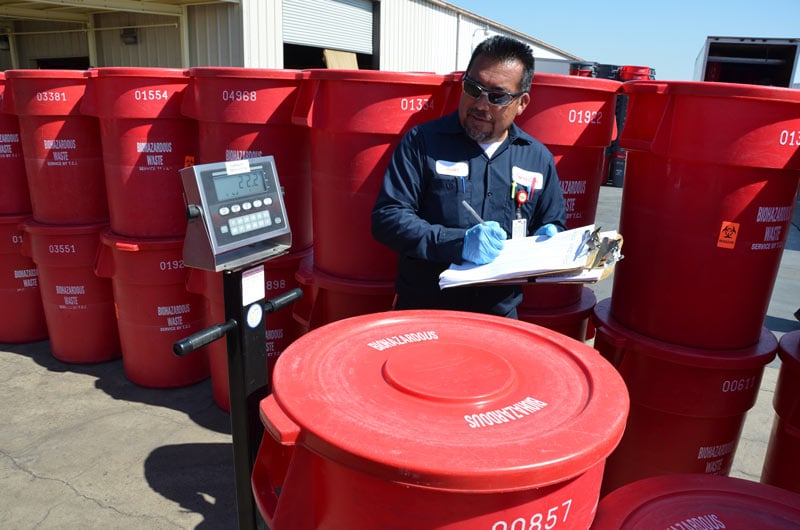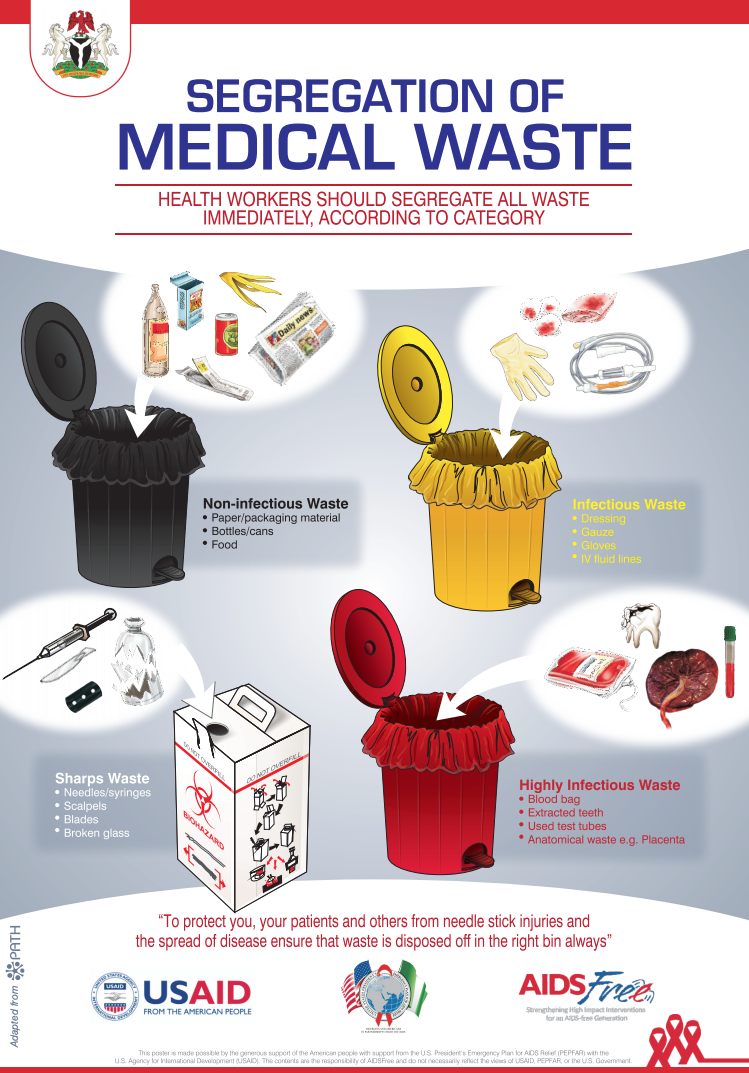Expert Medical Waste Disposal Service: Guarding Your Center and Community
Wiki Article
Making Sure Safe Handling and Disposal of Medical Waste
Guaranteeing safe handling and disposal of medical waste is of paramount significance in healthcare setups. Incorrect monitoring of medical waste can present considerable risks to the atmosphere, public health and wellness, and health care workers. This necessitates adherence to rigorous guidelines and methods for its safe handling and disposal. In this intro, we will certainly check out the value of correct medical waste monitoring, the risks related to improper handling and disposal, along with the standards and approaches that can be implemented to guarantee its secure disposal. Additionally, we will review the significance of training and education and learning for medical care professionals in order to keep a risk-free and tidy health care atmosphere. By adhering to these techniques, we can properly minimize the possible hazards connected with clinical waste.Importance of Correct Medical Waste Monitoring
Correct clinical waste management is of utmost significance in ensuring the safety and security and well-being of medical care experts, patients, and the general public. Clinical waste describes any type of waste generated by health care facilities throughout the diagnosis, treatment, or booster shot of pets or humans. This waste can present major health threats otherwise handled and disposed of appropriately.
Among the main reasons appropriate medical waste monitoring is critical is to stop the spread of transmittable conditions. Clinical waste, such as utilized needles, infected dressings, and biological materials, can carry damaging pathogens. If not dealt with and dealt with correctly, these microorganisms can be sent to healthcare employees, individuals, waste handlers, and also the general public, bring about the potential break out of diseases.
Additionally, proper clinical waste administration assists secure the atmosphere - medical waste removal service. Medical waste consists of unsafe materials, consisting of chemicals, pharmaceuticals, and contaminated substances. When not taken care of properly, these compounds can infect soil, water bodies, and the air, posing a considerable danger to environments and public health and wellness
Furthermore, effective medical waste monitoring guarantees conformity with regional policies and worldwide requirements. Governments and regulatory bodies have developed guidelines and methods to make certain the safe handling, storage space, transportation, and disposal of medical waste. Following these policies is necessary to prevent lawful repercussions and preserve the online reputation and trustworthiness of healthcare centers.
Dangers of Improper Handling and Disposal

If clinical waste is not appropriately disposed of,Individuals can also be exposed to these transmittable conditions. For circumstances, if polluted needles or other sharps are not taken care of in marked puncture-proof containers, they might inadvertently prick individuals, bring about prospective infections. If clinical waste is not set apart correctly, there is a risk of cross-contamination in between various types of waste, further boosting the chances of disease transmission.
Improper disposal of clinical waste can likewise have destructive impacts on the atmosphere and the public. If clinical waste is not treated and dealt with correctly, it can infect water sources, soil, and air, causing the spread of illness and contaminants. This can have read here long-term effects on ecological communities and public wellness.
Standards for Safe Handling of Medical Waste
Applying efficient procedures for the risk-free handling of medical waste is important in making certain the security of medical care experts, clients, and the basic public. These guidelines are important in reducing the dangers connected with the handling and disposal of clinical waste, such as infections, injuries, and environmental contamination.First and primary, health care facilities should develop a detailed waste management strategy that abides by neighborhood, nationwide, and worldwide laws. This strategy must include clear instructions on waste segregation, product packaging, labeling, transport, and storage space. It is essential to divide various kinds of waste, such as sharps, infectious products, pharmaceuticals, and non-hazardous waste, to avoid cross-contamination and promote safe disposal.
Furthermore, health care employees have to get detailed training on proper waste handling methods. They should be enlightened on the prospective dangers of medical waste, the appropriate use personal safety equipment (PPE), and the correct procedures for dealing with, transporting, and dealing with various sorts of waste.
Additionally, medical care facilities need to consistently monitor and audit their waste monitoring practices to guarantee compliance with guidelines. This consists of performing normal inspections, reviewing waste handling procedures, and supplying comments and training to team participants.
Efficient Strategies for Waste Disposal
To ensure the risk-free handling and disposal of clinical waste, it is important to utilize reliable techniques for garbage disposal. Clinical waste can pose significant risks to public health and wellness and the setting otherwise managed and gotten rid of appropriately. Therefore, health care facilities and waste administration companies must carry out proper strategies to mitigate these dangers.It includes dividing various kinds of medical waste based on their attributes. Healthcare centers must give clear guidelines and training to staff participants on exactly how to segregate waste properly.

Furthermore, medical care centers must work together with qualified waste administration business to ensure appropriate disposal of medical waste. These companies have the expertise and devices called for to securely manage and dispose of clinical waste in conformity with regulations and best practices.
Training and Education And Learning for Health Care Professionals
Medical care specialists play a critical role in ensuring the risk-free handling and disposal of medical waste with thorough training and education. It is important for medical care carriers to have a deep understanding of the possible dangers connected with medical waste and the proper protocols for its monitoring. By getting correct training, health care specialists can lessen the possible transmission of contagious diseases, prevent environmental contamination, and safeguard both themselves and the general public.
Moreover, training programs ought to emphasize making use of individual protective equipment (PPE) and proper hand hygiene techniques when handling medical waste. medical waste removal. Medical care experts ought to know how to correctly dispose and make use of of PPE to shield themselves from possible direct exposure to harmful materials. They need to likewise be informed on the value of routine handwashing and the proper use hand sanitizers to reduce the spread of infectious diseases
Continuing education and learning and regular updates on medical waste monitoring practices are essential for medical care professionals. As guidelines and guidelines develop, it is vital to keep medical care service providers educated about any adjustments in methods and ideal practices. This will certainly make sure that they remain current and preserve a high requirement of security in disposing and handling of clinical waste.
Final Thought
In conclusion, appropriate handling and disposal of medical waste is essential to make certain the safety of medical care experts, clients, and the atmosphere. By adhering to these methods, we can mitigate the prospective threats linked with medical waste.Clinical waste refers to any kind of waste generated by health care facilities during the medical diagnosis, therapy, or booster shot of pets or human beings. If clinical waste is not set apart effectively, there is a risk of cross-contamination in between different kinds of waste, further enhancing the opportunities of disease transmission.
It is important to separate various types of waste, such as sharps, transmittable materials, pharmaceuticals, and non-hazardous waste, to stop cross-contamination and advertise risk-free disposal. WasteX Medical Waste Disposal.
To make sure the safe handling and disposal of medical waste, it is necessary to utilize efficient methods for waste disposal. Additionally, health care facilities need to develop a regular waste collection and transport schedule to avoid waste build-up and decrease the risk of accidents or contamination.
Report this wiki page